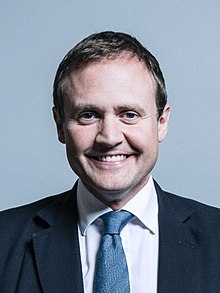Tonbridge MP Tom Tugendhat has coined a new phrase, ‘radio roulette’, after revealing that he changed his daughter’s nappy while being interviewed live at home on BBC Radio Four.
He was being grilled by John Humphreys on the flagship Today programme which has just under seven million listeners and often sets the news agenda for the rest of the media.
The Tonbridge MP has invented the ‘radio roulette’ concept for ‘when you book live radio interviews and you know you are the only one who can do childcare and you are alone in the house’.
He added: “So you do the interview down the link [hoping] your children either won’t wake up or they won’t make a sound. Sometimes you win and sometimes you lose.”
Mr Tugendhat is married to French supreme court judge Anissia Morel and has two children aged four and 18 months. He has frequently taken to Twitter to describe his parenting skills under the hashtag ‘solo dad’.
He said he ‘won rather a big game recently’ when he negotiated the 8.10am interview slot with John Humphrys on BBC Radio 4’s Today programme without the presenter realising he had been on nappy duty.
‘Radio roulette’ is reminiscent of ‘BBC Dad’ Professor Robert Kelly, who became a social media sensation after he was disturbed by both his children while being interviewed live on television in South Korea last year.
Mr Tugendhat, who chairs the Commons Foreign Affairs Committee, admitted he suffered an ‘epic loss’ last year, when an interview about Catalonian independence with LBC radio was cut short by his crying baby.
“My wife often has to go to Paris for the day to work, which means leaving very early and getting home very late, so I’m alone with the kids in the morning,” he told the BBC.
“If I have an interview to do, I just have to hope they don’t wake up and, if they do, that they’ll accept their breakfast in silence…or will let me change nappies without making a sound.”
There have been calls on the government to allow politicians to work more from home, especially young parents, in the wake of a controversial Commons vote last month.
The Conservative Chairman Brandon Lewis was criticised for breaking the informal ‘pairing’ arrangement with Lib Dem Deputy Leader Jo Swinson, who missed two crucial Brexit vote due to maternity leave.
Under the informal pact an MP in the Commons will voluntarily abstain so that his or her side does not benefit unfairly from the absence of opponents who may be on official business elsewhere.
The Tories won the votes by margins of two and six votes on the Trade Bill, and Ms Swinson called for an end to the ‘charade’ in favour of proxy voting.
Mr Tugendhat told the Politico website: “If you don’t need to be in Parliament then actually what I would do, of course, is I would spend most of my time in my community fixing local issues because that is something most people care about.
“I wouldn’t be in Westminster debating the issues of state, massive issues of government, and that is actually what an MP’s job is.”
Mr Tugendhat has served with the Army in Iraq and Afghanistan, and on Twitter he compared ‘multi-tasking childcare with a job’ to the work of service personnel.
“Soldiers in the British Army do it all the time,” he tweeted. “Apache pilots even learn to multitask their eyeballs with one eye controlling weapons and the other flying the helicopter.”
He went on to tackle the issue of ‘stereotypes in childcare’, saying: “We need to get beyond gender if we’re going to release talent in our society and stop the rest of us losing out because some have been forced to take time out and so are disadvantaged in promotion and influence.”
While admitting the great expense involved in procuring childcare in this country, he also cited the example of France, where crèches open early and close very late to allow parents to keep working.
“We need to think hard about how we enable men and women to choose, I mean actually choose, how they share childcare,” he said.
“That means thinking about the laws and support surrounding nurseries, childminders and so much more.
“It means being flexible, and look for ways to help those who could never afford full-time childcare.”








